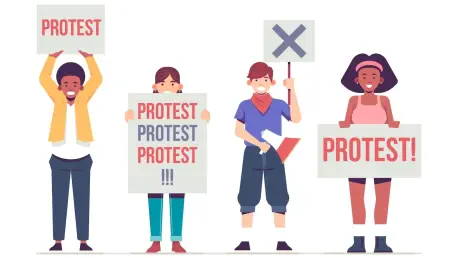In the ever-evolving landscape of American politics, Donald Gainsborough has long been a beacon of insight and expertise. As a leading voice in policy and legislation at Government Curated, Gainsborough offers a nuanced perspective on recent events unfolding in Los Angeles. His unique take on military involvement in domestic affairs draws on decades of experience and offers an anchor in these turbulent times.
Can you elaborate on why you believe deploying the Marine Corps to Los Angeles would not be considered heavy-handed?
The perspective that deploying the Marine Corps isn’t heavy-handed comes from the core principle of “peace through strength.” When a situation escalates to a point where local law enforcement struggles to maintain order, bringing in more robust forces can actually stabilize the environment. The presence of the Marines could act as a deterrent, reducing further violence and unrest by showing a strong commitment to restoring order.
What are the specific conditions under which Defense Secretary Pete Hegseth suggested deploying active-duty Marines to Los Angeles?
Secretary Hegseth indicated that the Marines are on high alert, prepared to assist if the situation worsens. The conditions revolve around the scale of the unrest and the ability of local forces to manage the streets effectively. If the violence against federal agents intensifies or if the protests reach a critical point beyond local capacities, that would likely trigger their deployment.
What does the principle of “peace through strength” mean in this context?
In this domestic context, “peace through strength” refers to preventing disorder by making it clear that the government is ready and willing to use its resources to maintain peace. It’s about projecting power to prevent the need to use it, which ideally should result in a peaceful resolution without further escalation.
Could you explain why the National Guard was deployed to the Los Angeles area amid the protests?
The National Guard was deployed due to the immediate need for additional support in managing the protests, which included violence against federal agents during deportation operations. Their deployment is often a rapid response to civil disturbances when local law enforcement needs help to reinstate order quickly.
What evidence is there of “violent mobs” attacking federal agents, as cited by White House press secretary Karoline Leavitt?
The reports from White House spokesperson Leavitt mention several incidents where federal agents were attacked. These are typically documented through a combination of eyewitness accounts, video evidence, and reports from the agents involved, painting a picture of the threats faced during recent operations.
What is the legal basis for deploying active-duty forces within U.S. borders, and what laws might need to be bypassed to allow such actions?
Generally, the Posse Comitatus Act restricts the use of federal military forces for domestic law enforcement. To deploy active-duty forces, those provisions must be bypassed, perhaps through invoking the Insurrection Act, which grants presidential authority to deploy troops under specific circumstances when order needs to be restored.
How do you respond to concerns about there being little precedent for deploying the National Guard without a state request?
It’s a controversial move because federal involvement typically follows a request from state officials. However, in this case, the federal government might justify it by citing a significant threat to federal interests or agents, suggesting an extraordinary need for intervention beyond regular protocols.
How do you address Senator Bernie Sanders’s claim that President Trump does not respect the Constitution or rule of law regarding the National Guard deployment?
Senator Sanders’s critique raises valid concerns about constitutional adherence and overreach. From a legal standpoint, there are contentious arguments about federal power versus state autonomy. Understanding these tensions is crucial to navigating and interpreting Trump’s actions within the framework of constitutional law and federal authority.
What was the response from California officials regarding the deployment of the National Guard and Marines?
California officials, both at the state and city levels, expressed displeasure over the lack of consultation in deploying the National Guard. They emphasized the undermining of local authority and the importance of abiding by established procedures for requesting federal assistance.
How does the administration justify military involvement in what some see as a law enforcement issue?
The administration insists that the scale and violence of the protests require more than law enforcement’s capabilities, framing military support as essential for stabilizing the situation. They argue it’s about protecting national interests and ensuring the safety of federal personnel during the unrest.
Are there any alternative strategies being considered to address the protests and the concerns surrounding them?
Indeed, officials are exploring dialogues with community leaders to address grievances and seek peaceful solutions. There’s a strong drive towards introducing de-escalation measures and collaboration between state and federal entities to minimize the need for military involvement while addressing the underlying issues fueling the protests.
What is your forecast for the situation in Los Angeles and similar instances of civil unrest?
Given the current trajectory, I anticipate more collaborative approaches will emerge between federal and state officials to handle unrest. A continued focus on understanding the root causes of these protests will be crucial, and any resolution will likely involve a blend of enforcement and dialogue to foster long-term peace.









